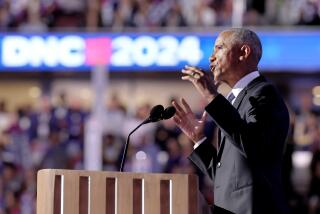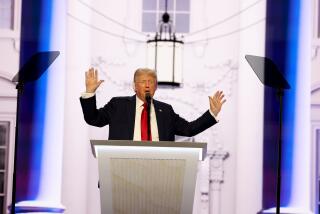Democrats Attack President’s Proposals as Too Little Too Late : Politics: Foley calls for a change from Republican economic policies of the 1980s. GOP lawmakers applaud Bush’s speech.
WASHINGTON — Congressional Democrats on Tuesday night attacked President Bush’s State of the Union proposals as too little and too late to deal with the recession, calling instead for fundamental change from the Republican economic policies of the 1980s to get the country moving again.
House Speaker Thomas S. Foley (D-Wash.), giving the Democratic response, reiterated the party’s plans for its own middle-income tax cut and its opposition to the reduction in capital gains levies that Bush proposed.
“The bottom line is that two-thirds of all the money from the Administration’s capital gains tax cut would go to the richest 1% of taxpayers,” Foley said in his televised address after the President had spoken.
If Foley’s remarks were no surprise, GOP lawmakers also reacted predictably to their President’s speech. Republicans expressed enthusiasm for Bush’s calls to freeze federal spending on every domestic program except Social Security, his call for investment-oriented tax cuts and the March 20 deadline he set for congressional action on his anti-recession program.
“The President was down but now he’s on the way up,” said Rep. Dana Rohrabacher (R-Long Beach). “He is going to show a new toughness with Congress and he’s going to be more effective.”
“He gave the speech of his life,” said Rep. David Dreier (R-La Verne), while Rep. Jerry Lewis (R-Redlands) declared: “The public is going to love this speech. He tapped the American spirit.”
Many Democrats, however, questioned how the Administration was going to pay for all the tax cuts Bush mentioned.
“It was inspiring, it was patriotic, but I would have loved to hear him say how he plans to pay for all these things,” said Rep. Dan Rostenkowski (D-Ill.), chairman of the House Ways and Means Committee. In the same vein, Rep. Leon E. Panetta (D-Carmel Valley), chairman of the House Budget Committee, said: “My greatest fear is how he’s going to pay for all these generous tax cuts. . . . It could send the wrong message to the financial markets if they add to the deficit.”
Other Democrats were equally critical. “The American people were expecting meat and potatoes on the menu tonight, and instead they got pot luck and leftovers,” said Sen. Robert C. Byrd (D-W.Va.). “These proposals alone will not right our economy.”
The same theme was struck by House Majority Leader Richard A. Gephardt (D-Mo.), who said: “The President promised to offer big changes and he did not deliver. . . . America needs a bigger and bolder program than the President has submitted, and middle-class families need a better break than the President offered.”
Rep. Barbara Boxer (D-Greenbrae) termed Bush’s speech “a sprinkling of election-year goodies which are going to do nothing to create jobs. . . . Unfortunately for America, he did not define an economic strategy.”
Sen. Edward M. Kennedy (D-Mass.) echoed the criticism, saying: “The most urgent challenge for Congress is to put more muscle into this anemic recovery plan and do what it takes to revive the economy.”
Foley, who is sometimes accused by fellow Democrats of going easy in criticism of the President, took aim not only at Bush but his Republican predecessor, Ronald Reagan, in the Democratic response.
“We seek a fundamental change from the unsuccessful economic policies of the past 12 years,” the Speaker said. “For when the economy is wrong, nothing else is right.”
Foley also denounced the President’s approach to health care legislation, charging that it was inadequate to correct a system under which millions of Americans are not insured and costs are skyrocketing.
“It is not enough to make minor repairs--to tinker at the edges while tolerating basic flaws,” Foley said. “We want to replace the status quo, not protect it.”
Foley said that he was speaking for working families and middle-class Americans as well as Democrats in his response.
“This should be America’s high noon,” he said. “Instead, after winning both a war in the Persian Gulf a year ago and the historic struggle of the last half century against communism, we face an ominous, persistent recession.”
Some liberal Democrats were more caustic. “If this is the defining moment in Bush’s presidency, then I think it’s going to be all downhill from here,” said Rep. Ronald V. Dellums (D-Berkeley).
“How much did that speech cost?” asked Rep. Vic Fazio (D-West Sacramento). “It was a very expensive speech, something to hang on every bough of the tree.”
Sen. Sam Nunn (D-Ga.), chairman of the Senate Armed Services Committee, voiced concern about the President’s decision to stop production of the B-2 bomber after 20 planes instead of building 75 as originally planned.
While politically popular, Nunn said, the decision does not protect U.S. ability to project military power around the world for the next three decades. Nunn added that he is disappointed that Bush made no provision to help “hundreds of thousands of defense workers who will lose their jobs in the next three years” because of defense cutbacks.
Times staff writer Michael Ross contributed to this story.
More to Read
Get the L.A. Times Politics newsletter
Deeply reported insights into legislation, politics and policy from Sacramento, Washington and beyond. In your inbox three times per week.
You may occasionally receive promotional content from the Los Angeles Times.









